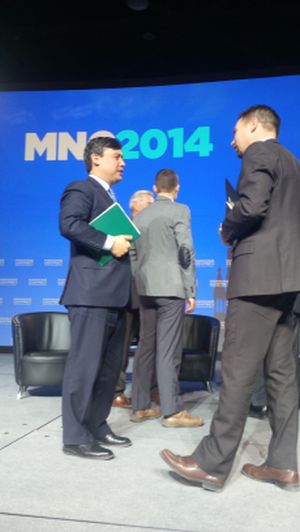“We need one issue candidates. One issue candidates are good. William Wilberforce was a single issue candidate.”
 These words are not my own. They came from the mouth of, wait for it… a sitting member of the governing Conservative Party of Canada. Michael Chong, Member of Parliament for Wellington-Halton Hills delivered this quip in one of his numerous replies Jay Hill, the former government whip for the Conservative Party. during a polite debate over Mr. Chong’s democratic reform bill.
These words are not my own. They came from the mouth of, wait for it… a sitting member of the governing Conservative Party of Canada. Michael Chong, Member of Parliament for Wellington-Halton Hills delivered this quip in one of his numerous replies Jay Hill, the former government whip for the Conservative Party. during a polite debate over Mr. Chong’s democratic reform bill.
The setting was the Manning Networking Conference, an annual gathering of conservative minded Canadians held in the nation’s capital. In a plenary session titled, Democratic Reform 2.0: Restoring the influence of Members of Parliament, MP Chong was advocating for his recently introduced Reform Act, 2013, a bill he believes will, “reinforce the principle of responsible government.”
Much has been written about the Reform Act and from media reports it appears that, although there are some detractors, it is receiving support from all political parties. One criticism leveled by Mr. Hill (also expressed here and here) is that by decreasing the power of the party leader there is an increased risk in having special interest groups take over entire riding associations.
In response, Mr. Chong stated, “We need one issue candidates. One issue candidates are good. William Wilberforce was a single issue candidate.” Chong then went on to single out the pro-life issue as a current example.
Chong is not an outspoken pro-life leader.
His point is not to champion the issue of abortion but rather to challenge the way in which Canadian policy is built, limited only to what the leadership of political parties are comfortable dealing with. Our readers know that abortion is a perfect example of an issue where nothing is being done because of a lack of political will or interest from the party leaders’ offices.
This is not just about forcing pre-born human rights onto the public agenda.
History shows that our country has always had elected officials focused primarily on one issue. For better or worse we have seen Tommy Douglas (health care), Svend Robinson (gay rights), Chuck Cadman (youth criminal justice), and Joy Smith (human trafficking) affect the Canadian landscape with their time dedicated to one issue.
Putting the Reform Act in context, one can’t help but think of Motion 408 and MP Mark Warawa’s attempt to have the House of Commons condemn sex-selective abortion. After Warawa’s motion was dropped from the parliamentary agenda on dubious grounds of not meeting proper criteria, there has been an ongoing public discussion about the state of democracy in Canada. And it’s getting louder all the time.
As Chong stated when introducing his bill,
Since Confederation, numerous and gradual changes have eroded the power of the Member of Parliament and centralized it in the party leaders’ offices. As a result, the ability of Members of Parliament to carry out their function has been curtailed by party leadership structures. The Reform Act proposes to address this problem by restoring power to elected Members of Parliament.”
Canada needs single-issue candidates. Michael Chong is absolutely correct. We should not be afraid of this in spite of party leaders maintaining a stranglehold on power by silencing any discussion that falls outside of their limited and mushy platform.
William Wilberforce’s campaign not only changed how Britain viewed slavery and the slave trade – it changed how the world thought about these injustices. The Reform Act will go a long ways towards allowing an elected official to put forward measures that would advance justice in the face of controversy. Canada, of all places, needs that today.